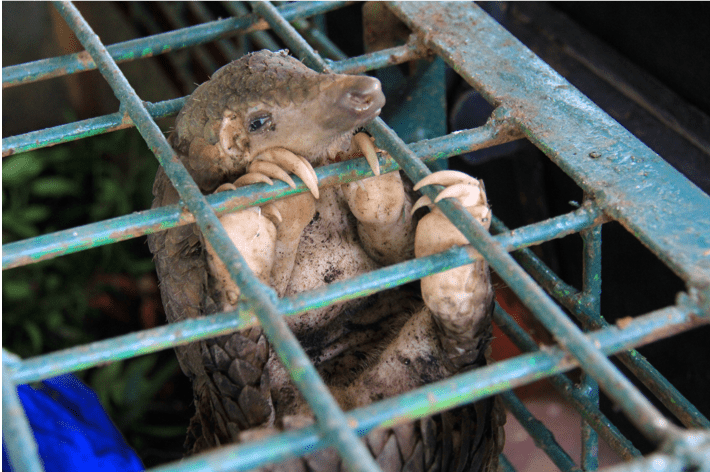The COVID-19 pandemic caused over 2 million infections and a shocking number of over 150 thousand deaths globally. As a consequence, the health systems in multiple countries, such as Spain, are threatened to collapse, not to speak of the gloomy forecasts for the economies. Beginning of April 2020, the BBC informed that conversation experts say the coronavirus pandemic originated at a market in China, selling wild animals. According to the WHO, FAO, and OIE, a leading risk factor of a pandemic is the increased demand for animal protein. However, it is not only us humans suffering from the consequences of our actions, but human consumption patterns have demanded its attribute for a long time already: The pangolin is a silent victim, threatened of extinction.
The Pangolin listed as highly threatened
With the beginning of the COVID-19 pandemic, the wildlife trade appears on the radar of the broad public. However, the trade with pangolins shows worrying developments already for years. The number of this unique mammal in Asia, but also Africa, is decreasing rapidly. The reason for this is the illegal trade in pangolin products, which has long been large international business. In addition to China, Vietnam is a central destination.
It is estimated that pangolin is poached every five minutes. They are taken out of their habitat, crammed into tight nets and carted through the country for days, to be illegally resold and killed. According to Pro Wildlife, about 100 thousand pangolins are caught each year, with which the pangolin is considered highly threatened by the IUCN (International Union of Conversation of Nature and Natural Resources).
The Uniqueness of an unfamiliar Mammal
Many people are not even aware of the existence of the pangolin, even though it is incredibly unique and distinctive from many other mammals. The pangolin, which is about the size of a cat, inhabits savannas, forest, and scrubland. With its unique shell consisting of hard scales, it can protect itself against natural predators. In the event of fear or danger, it quickly rolls itself into a ball. It folds out its sharp-edged scales and makes it impossible for its enemies to eat it. Therefore, the only real enemy of the pangolin is the human being, as he can easily catch the curled up animal.
Demanded for Medicine and Meat
The reason for the almost limitless poaching is mainly the scales of the animals that are highly demanded in the traditional medicines of Africa and Asia. Although they consist only of keratin like human fingernails and toenails, the scales are officially listed as a pharmaceutical in China. They are also part of ritual healing methods, which makes it even more challenging to convince people that pangolin products are not useful. Further, pangolin meat is also considered a delicacy that is popular with the growing middle class in China and Vietnam.
Actions have to follow
With China forbidding the trade with wildlife in April 2020, as a consequence of the COVID-19 epidemic, there is some hope. However, there also have to be stronger international forces against the already illegal wildlife trade, so that species, such as the pangolin, can survive. Not only do we diminish the diversity mother nature has to offer, but we also make the earth a dangerous place to live: With our actions, we change the environment, and pathogens become increasingly unbalanced. As a result, new dynamics lead to infectious diseases such as the COVID-19 pandemic. Thus, this pandemic could be considered a lesson on cause and effect.
It brings many challenges with it, but also an opportunity: to reflect on our consumption patterns and actions, to change these long lastingly.
